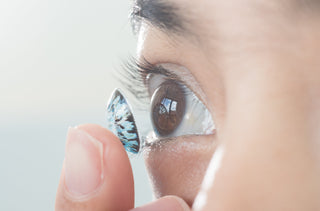Swelling under the eyes is often due to fluid build-up or tissue inflammation. Swelling under the eye may or may not be painful. Most under-eye swelling can be treated at home without medical intervention. However, it is important to be sure of the causes of the swelling to treat it properly. Here are the different causes of under-eye swelling and the symptoms to watch out for.
What causes swelling under the eye?
Swelling under the eye can range from mild to severe. It can be associated with a multitude of underlying causes. It could be a seasonal pollen allergy. It could be an allergy to pet hair or a cleaning product. You may react to the latest eye pencil or perfume you just bought. Airborne products, such as environmental pollutants, dust and home fragrances, can also impact eye health. Now let's take a closer look at all of these causes.
The most common causes of under-eye swelling
The most common causes of swelling or bags under the eyes are allergies. These can be local allergies following contact with a product or an allergy in your body (seasonal allergy, food allergy, etc.). Swollen eyes can also appear as a side effect of an allergic reaction, as it happens with allergic rhinitis.
You should also be aware that crying and lack of sleep can cause swelling under the eyes. A 7-to-8-hour night's sleep is ideal for your body to be fully rested.
A blocked sebaceous gland or an infection in a hair follicle can also cause swelling under the eye. This is the case, for example, when a stye or chalazion develops.
Eye conditions, such as styes, chalazion, conjunctivitis or corneal herpes, are not serious if treated promptly. Consult an Optometrist to preserve your visual acuity.
If you feel discomfort after the swelling has gone down or if you feel discomfort in your vision, make an appointment with an Optometrist.
Less common causes of under-eye swelling
Among the less frequent causes:
- Insect bites
- A lesion under the eye that causes inflammation
- Fluid retention, as in the case of edema
- Preseptal or periorbital cellulitis
- Thyroid problems
In this case, it is advisable to consult a healthcare professional as soon as possible.
How to relieve swelling under the eye?
Most under-eye swellings are harmless and can be treated at home. However, if the swelling does not go down within a few hours, it is best to seek medical attention as a precaution.
Here are some tips to relieve swelling under the eyes:
- Avoid rubbing your eyes
- Avoid wearing your contact lenses or makeup
- Apply a cold-water compress using a sterile compress and sterilized water. The action of the cold reduces the swelling of the tissues. But be careful
- not to use water that is too cold which was in the refrigerator.
- Moisturize your eyes well with eye drops
- Lie down and close your eyes to rest them
How to prevent swelling under the eye?
Swelling under the eye can be caused by many things. There are ways you can prevent them:
- Be sure to clean and care for your contact lenses
- Wash your hands often during the day, because without paying attention, we regularly touch our faces
- Monitor the composition of any new hygiene and makeup products that come into contact with your eyes
- Check that your cleaning products and home fragrances do not contain allergens
- Avoid exposing your eyes to cigarette smoke
- Avoid eating too salty dishes because a diet too rich in salt promotes water retention
What are the main treatments for swelling under the eye?
There is no specific treatment for under-eye swelling. The best way to treat under-eye swelling is to treat the cause. It is essential to keep your eyes well moisturized since teardrops are a natural protective barrier. Heating, air conditioning and screens tend to dry out your eyes. Do not hesitate to use eye drops regularly.
When should you consult for swelling under the eye?
Although most eye swelling is benign, it can signify a more serious health problem. If the swelling doesn't go down within a few hours following basic home care, it's best to see a doctor.
Symptoms to watch out for in case of swelling under the eye are:
- Fever
- A loss of visual acuity
- Double vision
- Pain that intensifies instead of decreases
Your vision is one of your most precious assets, as it is your window to the world! Even if there is no reason to be alarmed by a swelling under the eye, vigilance is always required.
Keep in mind that swelling under the eye is often of no consequence to your health. This is the case, for example, when it is a reaction of the body due to fatigue, crying or allergies. However, this eye disorder can be caused by an illness affecting another part of the body. Anyone who notices vision problems or fever should seek medical attention as soon as possible.
The entire IRIS team is at your side to answer your questions and offer you the best service. We believe that information is an essential resource for individual and collective protection. As always, we are committed to providing you with the best information on visual health.





















































